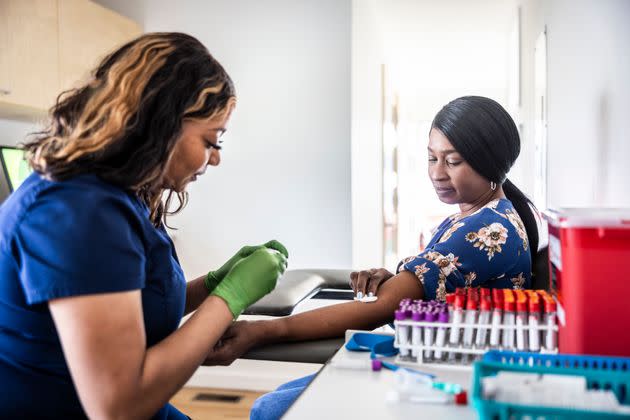If You Hate Getting Your Blood Drawn, Try These 5 Tips

Getting blood drawn can be an uncomfortable experience for many people. The mere thought of a needle pricking their skin can trigger anxiety and make people feel dizzy and lightheaded.
In fact, roughly 1 in 10 people struggle with trypanophobia, the term for being fearful of needles, and 2.5% of adults pass out during or immediately after a blood draw.
It’s common to get jittery about needles, but an intense fear of syringes can cause some people to avoid necessary bloodwork, thereby increasing their risk of becoming seriously sick. It’s an overlooked issue, research suggests, but one that can be effectively managed with a bit of preparation.
We asked two mental health professionals how they help their patients get through blood draws. Here’s what they said:
First, here’s why you faint during blood draws.
According to Lienna Wilson, a licensed psychologist in Princeton, New Jersey, there are two main reasons why people faint during blood draws: their genetics and psychological health.
“As with many mental health conditions, phobias have a genetic component, meaning that if your parents or relatives suffer from anxiety, you are more likely to have a genetic predisposition to developing an anxiety disorder,” she said.
In addition, many people develop phobias, such as a fear of needles, due to negative experiences in the past. If, for example, someone had a horrible or traumatic experience having blood drawn when they were younger, they may get nervous about the procedure years later as an adult. Trypanophobia is also more common in people with chronic conditions that require frequent injections or blood draws, evidence shows.
Trypanophobia causes a vasovagal response, which is a physiological reaction that occurs when a person’s heart rate and blood pressure briefly malfunction. A spike in blood pressure and heart rate leads to a sudden drop in blood pressure and heart rate, which reduces blood flow to the brain and, finally, a loss of consciousness, Wilson said. In short: You see a needle, your heart rate and blood pressure go haywire and you faint.
Reframe how you think about needles.
If you’re terrified of blood draws, you probably associate needles with pain and discomfort, causing you to panic when it comes time to roll up your sleeve. David Klemanski, a Yale Medicine psychiatrist and associate professor of psychiatry at Yale School of Medicine, said cognitive restricting, or changing unhelpful thoughts, can help you conquer your fears.
His advice: Try to challenge the belief that the needle causes pain. “Instead, you might try to adjust your initial belief by reminding yourself that injections are uncomfortable, but the pain is usually brief and manageable,” Klemanski said.
Or remind yourself you’re simply getting a quick pinch that’ll be over in seconds and that you’ve probably experienced worse pain before and have been OK, he said.
Practice applied muscle tension.
One of the most effective ways to avoid passing out during blood draws or blood donations is by practicing applied muscle tension (AMT). To go about this, you simply want to flex the major muscles in your legs, arms or glutes either before you feel the prick or as soon as you start to feel dizzy or clammy, Wilson advised.
The American Red Cross recommends crossing your legs, squeezing your knees and tensing your abdominal muscles for five seconds ― then relax for five seconds and repeat the exercises. AMT raises your blood pressure, helping to combat the drop in blood pressure that can lead to fainting, Wilson said.

Take deep inhales and exhales.
Deep breathing has also been shown to help people stay calm ― and conscious ― during blood draws. Avoid taking quick or forceful breaths; instead, practice taking slow, deep sips of air. The Cleveland Clinic recommends counting to four on each inhale and exhale.
Deep breathing techniques can regulate your body’s physiological response to stress and anxiety, and put you in a a calmer state as you head into the procedure, according to Klemanski. It “activates the parasympathetic nervous system, which can counteract the fight-or-flight anxiety response and induce, to a degree, relaxation.”
Be prepared to distract yourself.
Come up with a few ways to take your mind off of the blood draw. Download an engaging TV show on your phone, stream a podcast or text a friend. You can also distract yourself by having a conversation with your provider and asking them about their day.
“Distraction techniques can shift the individual’s focus away from the needle, reducing anxiety and discomfort during the procedure,” Klemanski said. Essentially, by keeping the brain busy with a different task, there are less cognitive resources available to focus on the syringe, he said.
Give exposure therapy a try.
If you try the above tips but still struggle with blood draws, consider meeting with a mental health counselor. They can provide a type of therapy called cognitive behavioral therapy, or CBT, to help you tackle your fear of needles.
One of the most effective strategies used for phobias is exposure therapy, or a technique in which a person is gradually exposed to the thing they fear. In the case of trypanophobia, your therapist will ask you to discuss different situations that might ignite your dread of needles.
“You would start with exercises that cause a manageable amount of fear and then gradually increase in intensity,” Wilson said.
The purpose, Wilson said, is to help people learn to tolerate the discomfort they feel about needles and injections by, for instance, watching videos of the procedure, viewing pictures of it or holding a needle and syringe. Eventually they won’t feel as clammy or short of breath when they think about needles or head into an appointment.
If you dread getting your blood drawn, know that you’re not alone. It is a very common and natural response. But shifting your perspective and coming prepped with a game plan can make the procedure significantly more tolerable ― and, at the very least, prevent you from passing out.

